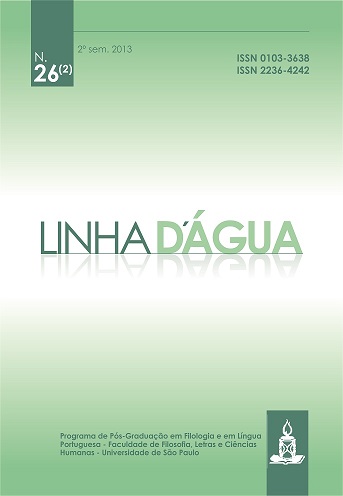The linguistic anchorage of polyphony
DOI:
https://doi.org/10.11606/issn.2236-4242.v26i2p135-158Keywords:
Polyphony, Linguistic anchorage, Language.Abstract
Linguistic studies of polyphony bloom and seem more important than seeking excavate the concept of language underlying the application of this metaphor. First of all, we noted that the starting point of the whole theory of linguistic polyphony seems to be the assumption that the polyphony of utterances leaves traces on the level of language. It is this assumption that makes the study interesting for the linguist. But what is the nature of these traits? I defend the hypothesis that the polyphony is anchored in the linguistic form itself, or more specifically, the linguistic system, the language engenders indications that refer to the polyphonic meaning of the utterances. The article consists of three parts. At first, I study the notion of linguistic anchorage and I propose a formalization and method for its study . Second, I present a brief introduction to ScaPoLine (Scandinavian theory of linguistic polyphony) that applies to this method , and in the third part, I offer some analysis of concrete examples of polyphony.Downloads
Downloads
Published
Issue
Section
License
The Editorial Board authorizes free access to and distribution of published contentes, provided that the source is cited, that is, granding credit to the authors and Linha D'Água and preserving the full text. The author is allowed to place the final version (postprint / editor’s PDF) in an institutional/thematic repositor or personal page (site, blog), immediately after publication, provided that it is available for open access and comes without any embargo period. Full reference should be made to the first publication in Linha D'Água. Access to the paper should at least be aligned with the access the journal offers.
As a legal entity, the University of São Paulo at Ribeirão Preto School of Philosophy, Sciences and Languages owns and holds the copyright deriving from the publication. To use the papers, Paidéia adopts the Creative Commons Licence, CC BY-NC non-commercial attribution. This licence permits access, download, print, share, reuse and distribution of papers, provided that this is for non-commercial use and that the source is cited, giving due authorship credit to Linha D'Água. In these cases, neither authors nor editors need any permission.
Partial reproduction of other publications
Citations of more than 500 words, reproductions of one or more figures, tables or other illustrions should be accompanied by written permission from the copyright owner of the original work with a view to reproduction in Linha D'Água. This permission has to be addressed to the author of the submitted manuscript. Secondarily obtained rights will not be transferred under any circumstance.










